Court Character Reference Letter Template
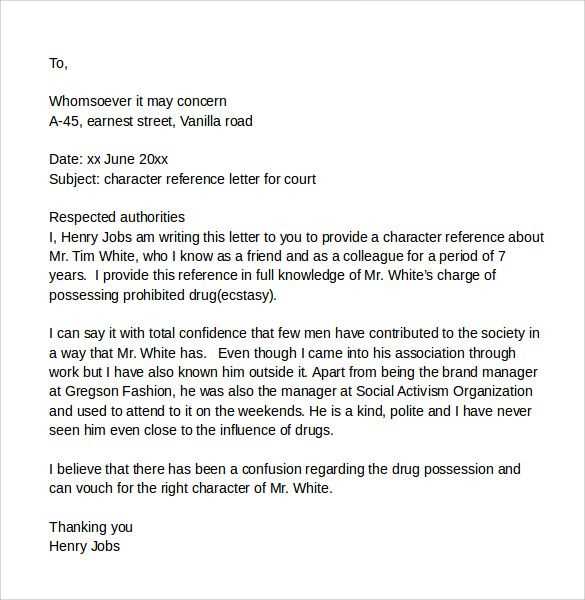
When someone faces legal proceedings, a well-written personal endorsement from a trusted individual can play a crucial role. This type of support can provide a positive insight into the individual’s character, helping to influence decisions. The document must be sincere, clear, and offer specific examples of the person’s behavior and qualities.
Why a Personal Endorsement Matters
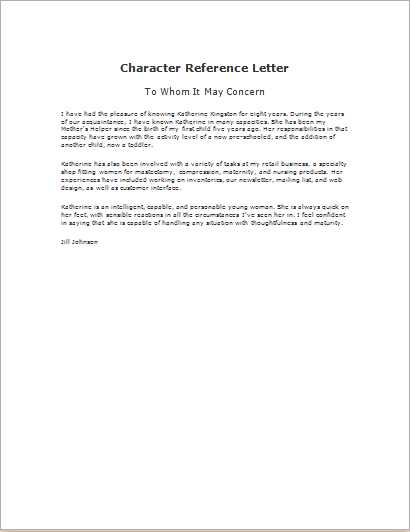
In any legal case, showing one’s moral integrity and good character can greatly impact the outcome. A strong endorsement from a respected individual can offer a compelling argument that the person involved is trustworthy and deserving of leniency. It serves as a reflection of the person’s reputation and behavior within their community.
Essential Components
While writing, it’s important to focus on a few key details. Here are the components that should be included:
- Introduction: Identify yourself, your relationship with the individual, and the purpose of the letter.
- Personal Qualities: Mention the individual’s key attributes, such as honesty, responsibility, and kindness.
- Specific Examples: Provide real-life situations where the individual demonstrated positive qualities.
- Conclusion: Offer a final endorsement, reiterating your belief in their character and trustworthiness.
Tips for Writing an Impactful Endorsement
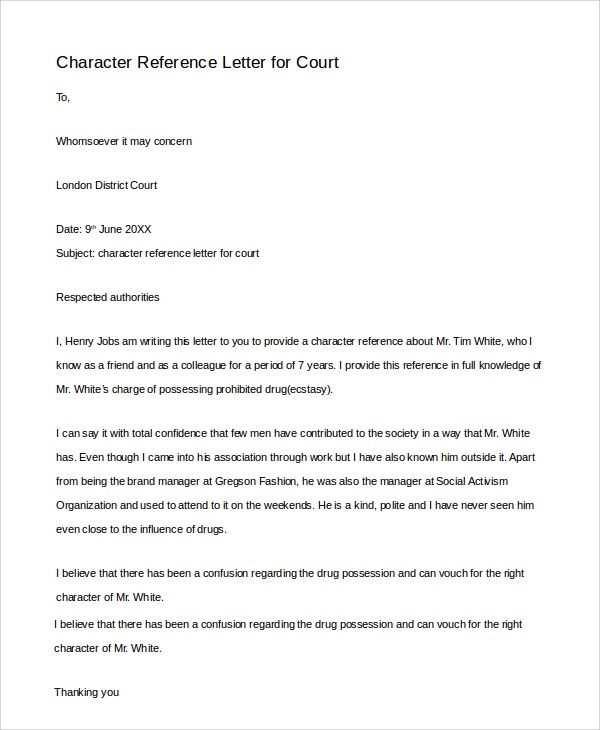
When crafting this type of document, it is essential to maintain a tone of sincerity and respect. Be sure to keep your language formal, but also genuine. Avoid using overly complicated words or too much jargon. Instead, focus on clarity and providing the reader with a complete picture of the person’s moral fiber.
Avoiding Common Mistakes
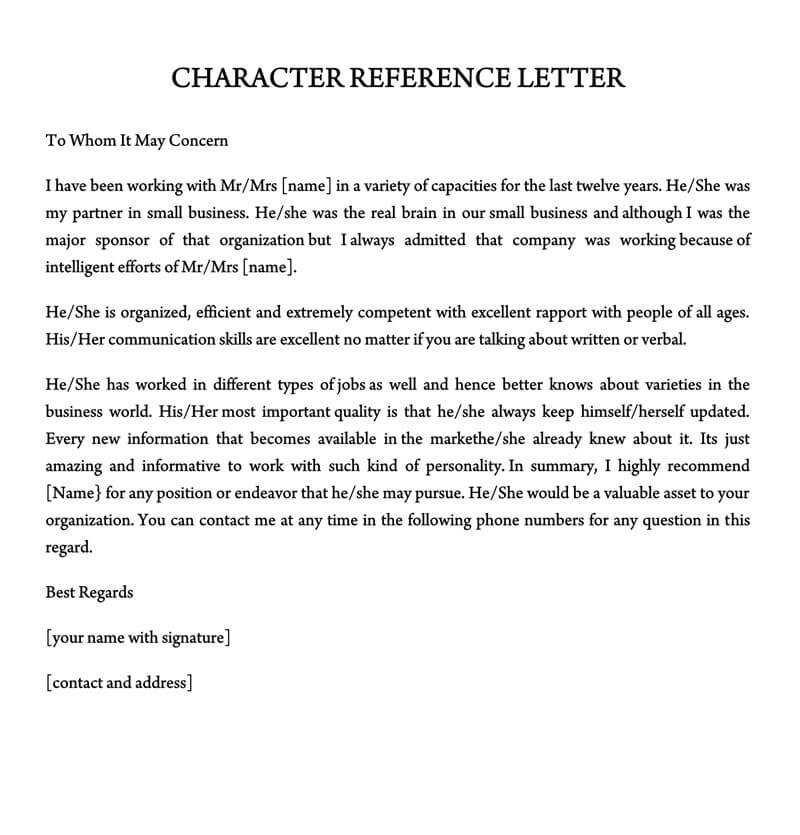
There are several common pitfalls when writing a support letter:
- Being too vague: General statements are not as effective as specific examples that paint a vivid picture of the person’s behavior.
- Exaggeration: Avoid inflating facts or overstating the individual’s good qualities; it’s important to maintain credibility.
- Failure to proofread: Ensure there are no grammatical errors or awkward phrasing that could detract from your message.
Sample Scenarios for Inspiration
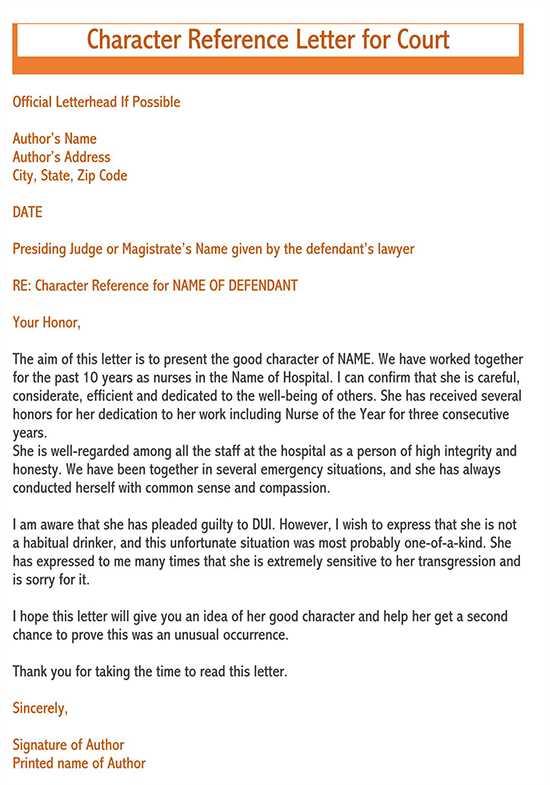
To help get started, here are a few examples of how to frame your endorsement:
- Volunteer Work: “I have worked alongside Jane for over five years in various community projects, and her dedication and kindness have always impressed me.”
- Professional Behavior: “As a colleague, John consistently demonstrated integrity in his work, always going above and beyond expectations.”
- Family Relationships: “As a parent, Sarah has shown incredible responsibility, always prioritizing her children’s needs and well-being.”
Personal Support Letter Guide
When an individual is involved in a legal matter, presenting their good reputation and positive traits can significantly influence the outcome. A well-composed support document can serve as a testament to their integrity, offering a deeper understanding of their personality beyond the case itself. This section provides guidance on crafting such a document effectively.
Why a Personal Endorsement Matters
A well-written endorsement can be crucial in legal situations, offering insight into the individual’s moral values and behavior. It can strengthen their case by demonstrating their standing within their community and highlighting their positive contributions. A strong personal endorsement could potentially sway decisions in favor of the person involved.
How to Structure a Strong Support Document
The structure of your endorsement should be clear and concise. Start by introducing yourself and your relationship with the individual, then proceed to describe the person’s attributes, backing them up with specific examples. Finally, conclude with a heartfelt recommendation, affirming your belief in their character and trustworthiness.
What to Include in Your Document
Key elements to include are:
- Introduction: Briefly introduce yourself and explain your connection to the person.
- Qualities: Describe the individual’s most notable traits, such as honesty, reliability, and kindness.
- Examples: Offer concrete examples where the individual displayed their positive qualities.
- Recommendation: Close with a clear, strong statement supporting the individual’s character and integrity.
Tips for Writing an Impactful Support Document
Be sure to maintain a formal, respectful tone throughout the document. Focus on being specific, using real-life examples to showcase the person’s attributes. Keep your language straightforward and avoid unnecessary embellishments. The goal is to provide a genuine, compelling portrait of the individual’s character.
Common Errors to Avoid in Endorsements
Some common mistakes include:
- Vagueness: Avoid using overly general statements without supporting details.
- Over-exaggeration: Don’t overstate the person’s qualities, as this can undermine the credibility of the letter.
- Neglecting proofreading: Ensure your document is free from spelling or grammatical errors, as these can weaken your argument.
Examples of Personal Endorsements
Here are some examples of how you can frame your endorsement:
- Volunteer Contribution: “I have had the privilege of working with Mark on several community initiatives, where his dedication and reliability were always apparent.”
- Professional Integrity: “As a colleague, John consistently demonstrated a high level of professionalism, always meeting deadlines and showing respect for others.”
- Family Values: “Sarah has always been a devoted mother, making her children’s well-being a top priority in every situation.”